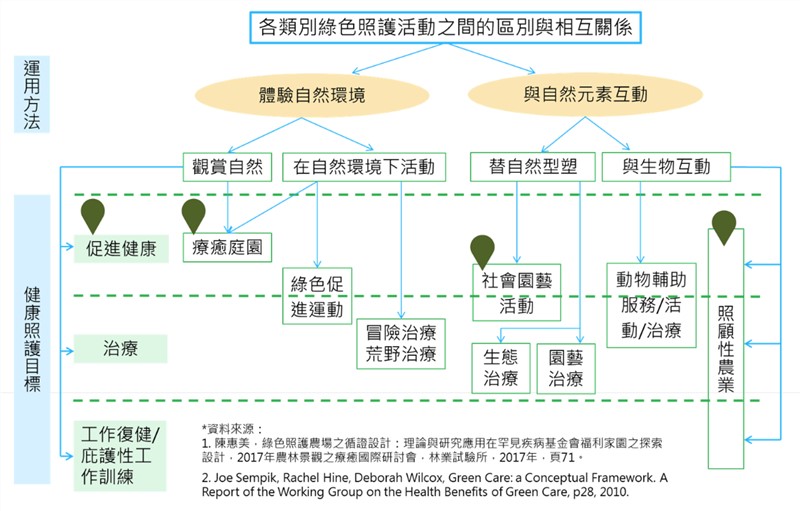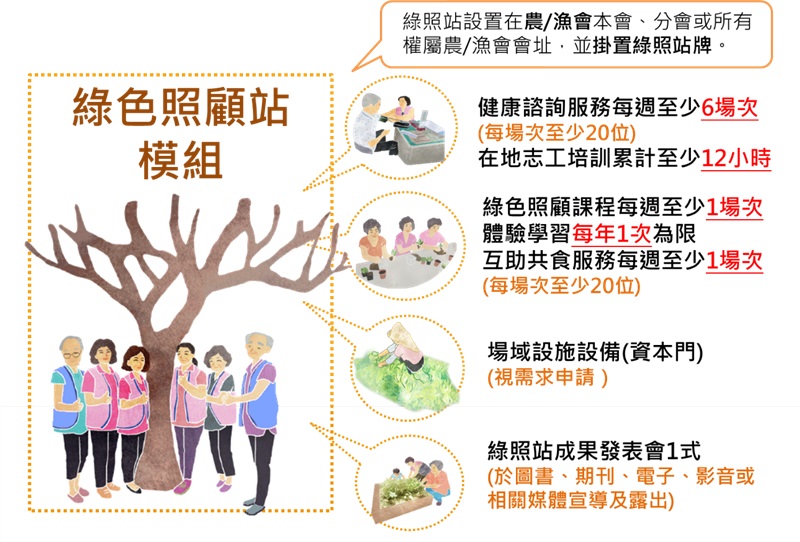The Importance of Green Care for the Elderly
Liang, Ting Hua(China Productivity Center Agriculture Management Department)
Based on the standards of the United Nations, the population structure in Taiwan reached the level of aging society (i.e. people aged over 65 account for 7% of the total population) in 1993, the aged society (i.e. people aged over 65 account for 14% of the total population) in 2018, and is estimated to reach that of super-aged society (i.e. people aged over 65 account for 20% of the total population) by 2025. It can be observed that it took Taiwan 25 years to transform from an aging society to an aged society, but may take only 7 years to transform from an aged society to a super-aged one. Therefore, care for the elderly will be an important key indicator for the future development.
Currently, elderly care institutions in Taiwan include Level C community long-term care stations governed by the Ministry of Health and Welfare, the elderly learning centers organized by the Ministry of Education, and the rural community service centers of the Council of Agriculture (abbreviated as COA). The COA has established networks for the innovative learning, mutual assistance, and volunteer programs for the elderly in the farmers' associations. The content of learning for the elderly in rural areas is mostly in domains of leisure, entertainment, and arts, but not yet well organized in a comprehensive structure. To avoid overlapping functions with the Level C community long-term care stations of MHW, green care programs for healthy and sub-healthy elderly people would involve domains like horticultural therapy, healthy landscapes, food and farming education, agricultural rehabilitation, and local revitalization. And the local networks of the agricultural and fishery associations would be activated in conjunction with the rural communities to launch various green care programs.
Despite the increasing proportion of the elderly population, there is still lack of planning and design of the home environment for the elderly. The decline in physical fitness and mobility is common and often causes falls with consequential irreversible injuries including being bedridden. Many studies indicate that the quality of landscape affects the physical and mental health so garden activities are desirable habits to develop by the elderly, improving their health, lightening chronic diseases, and increasing opportunities for socializing. Being in contact with nature and increasing social contact helps the elderly relieve from their diseases. Therapeutic effects of gardens improve the physical, psychological quality of life, and ease dementia of the elderly.
What is Green Care?
The term green care is not a totally new concept. COA has always provided sponsorship to local agricultural organizations and local communities to improve and enhance the quality of life of the elderly. In 1955 and 1956, the Farm Life Improvement Program was an important program to integrate housekeeping and the 4 Hs to form rural communities. In the 1970s, the period of rapid economic transition, the pursuit was not just for satisfaction of basic needs for food and clothing but also for kitchen hygiene and nutrition. In the 1990s, the needs were more than for basic life satisfaction but also for higher quality of cuisines. So, in the year 2001, home economic programs were designed for rural housewives to develop community service skills as a second career on the basis of their good cooking, and their services were directed towards the elderly in the rural communities through caring for and food catering for the elderly with no family. The solid housekeeping organization has facilitated rural women to exercise their strengths in the promotion of local products and special features so service centers (bases) were set up in 2008 to serve the elders. In 2019, the Top Ten Green Care Programs were awarded. And in 2020, green care stations were actively promoted.
- The scope and concept of green care
The scope of Green Care, according to the literature review made by Chen Hui-Mei, means: "the use of agriculture, gardening, animals and other outdoor natural space, etc., in conjunction with the concept of health care and the use of life and non-life elements, as a way of treatment, to promote the physical, psychological, social and educational well-being of individuals, so as to improve the quality of life." The aim is to promote health without medical behavior.

Figure 1: Scope of Green Care
With the healthy and sub-healthy elderly as the main target of service, green care is developed, taking advantage of the multi-functionality of agriculture, farming and fishing village environment and natural elements as an opportunity, with the concept of health integrated, not only to assist the local elderly to age healthily, but also to attract other elderly people to enter the villages to experience the interaction between human beings and natural things to heal their bodies and minds.
- Three domains of green care
Green care includes three themes: mutual support of agricultural organizations, interaction of green elements, and sharing of health territories. Based on these themes, COA has implemented a green care promotion demonstration project this year, in which 31 green care stations were opened in famers and fisheries associations nationwide with service modules formed to assist healthy and sub-healthy elderly to age healthily, enjoy longer years in health, and to reduce the cost on the society.

Figure 2: Green care station service modules
Using agricultural activities to improve people's physical, mental, and spiritual conditions, the green care courses are mainly of two types. One is purely landscape therapy addressed to the sense of vision, which is also known as health territories, in which sensory stimulation helps to relieve negative emotions such as stress and sadness. The other is activity participation, i.e. an experiential perception by hands-on participation, such as sowing, flower arranging, flower pressing, moss balls etc. In addition to the green care courses, dining-together activities are organized for the elderly, with food made of ingredients of local production traceability, balanced diet and texture and taste suitable for the elderly.
The Importance of Green Care for the Elderly
- Positive emotional changes in the elderly
Green care serves many functions, including the opportunities for the elderly to socialize, exercise physically, adjust their mood with relaxing visual enjoyment. The elderly often suffers organic disorders, namely dementia and Alzheimer's disease. These are caused by impairment or loss of memory, together with impairment of thinking and judgment abilities. Foreign studies have shown that the elderly who participate in horticultural therapy receive more external stimuli in terms of touch, smell, and vision than their peers who participate in general activities. Green care activities, with high degree of participation, means increased interaction and socializing, with more stable and pleasant mood (Robson and Troutman-Jordan, 2015).
- The benefits of green care
Plants are living organisms. In caring for plants, one continuously feels the development of life. The new seeds and new leaves and the blooming and falling of flowers constitute an endless cycle of life. The elderly gets an enhanced sense of self-affirmation when there is a life that needs their tender loving care. Activities with the green and natural elements of the local communities integrated with the experience of the five senses can help the elderly leave the loneliness in innovative and diverse activities such as guided tours, food and farming, gardening, flower art, LOHAS handicrafts, youth and elderly exchanges, etc.
Conclusion
Facing the imminent approach of a super-aged society, the care of the elderly is becoming increasingly important. Taiwan has a large group of "otaku seniors". They lack social life, stay in a closed environment, do not exercise physically, and lack external stimulation, so loneliness and depression often sneak up on them. This is a hotbed for the exacerbation of dementia and related chronic diseases. The rise of gerontechnology is to promote "aging in place", i.e. staying in their own residence without moving into a nursing home. The Long-term Care 2.0 policy arranges regular visits to the elderly for basic care. This only solves the physiological problems of the lonely elders. But what about the psychological side? Retirement and aging also means alienation from the past. Green care based on the cooperation of farmers’ and fishermen’s associations and the networks of rural communities provides care for the physical and mental health of the elderly. This would encourage the elderly to re-enter the community, enhance their sense of identity with the community they live in, and develop new social relationships.